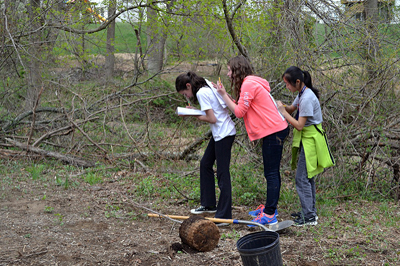State Parks, Research Reserves, and more offer the opportunity for teachers to take the classroom outside!
 The Department of Natural Resources encourages teachers to use state parks and other public lands as engaging settings for outdoor environmental learning and to meet environmental literacy requirements. We recommend teacher-led programs and this site offers resources to help you.
The Department of Natural Resources encourages teachers to use state parks and other public lands as engaging settings for outdoor environmental learning and to meet environmental literacy requirements. We recommend teacher-led programs and this site offers resources to help you.
Maryland’s public lands are a perfect confluence of natural and social systems—history, science, culture, geology and more--that will enrich your classroom work, provide great phenomena to anchor student investigations, and support your Meaningful Watershed Educational Experience (MWEE). Use these natural outdoor laboratory investigations as comparisons to investigations students are doing elsewhere, such as on your school grounds.
Wait! What is a MWEE? MWEEs are learner-centered experiences where students can investigate environmental issues that lead to informed problem-solving and action. A MWEE is best accomplished as an integral part of the existing curriculum, as an approach to learning that helps you meet requirements such as Next Generation Science Standards and Maryland Environmental Literacy standards. The essential elements of a MWEE are:
-
 Issue Definition (The BIG idea or the organizing question)
Issue Definition (The BIG idea or the organizing question) -
 Outdoor Field Experiences (Curriculum anchor; issue or phenomena investigation)
Outdoor Field Experiences (Curriculum anchor; issue or phenomena investigation) -
 Synthesis and Conclusions (Where do students' observations and data lead them?)
Synthesis and Conclusions (Where do students' observations and data lead them?) -
 Stewardship Action Projects (What can students do to address what they’ve learned?)
Stewardship Action Projects (What can students do to address what they’ve learned?)
The Chesapeake Bay Program's MWEE Guide contains easy to use tools to help you plan your full MWEE, including classroom work and field investigations. The guide can help you to integrate the outdoor learning activities provided on this website within the context of a MWEE, delivering integrated content standards across your curriculum.
Maryland State Parks
Most state parks offer school group visits at low to no cost. If you are requesting a fee waiver for your visit, click on the Maryland Park Service School Group Waiver Form below, complete, and return to the park you would like to visit. You will find addresses on our
map page when you click on each park or site.
Are you a 4th grade teacher? The
Maryland Park Service will honor the
Every Kid in the Park passes for 4th grade classes to receive free admittance.
 School Group Waiver Form
School Group Waiver Form
Before you visit a state park:
-
Contact the park you wish to visit and ask to speak to the Education Coordinator/Ranger to confirm any needed facilities and logistics for your visit.
- Please visit the park ahead of the trip to ensure you are familiar with the areas you will be using with your students. This is especially necessary for any stream investigations.
National Estuarine Research Reserves
There are many different kinds of public lands that can be used to support your environmental literacy efforts and field investigations. The Maryland Chesapeake Bay National Estuarine Research Reserve (CBNERR-MD) offers three living laboratories for students and teachers of all disciplines. What sets them apart from other public lands are the facilitated field investigations offered for a small fee. If you're still looking for additional support and/or full-on field trip facilitation, consider the CBNERR-MD sites and
contact the reserve you wish to visit. These are also listed on our
map page.
Other Public Lands
Good communication and planning are needed if you are using public lands other than state parks, as facilities and resources will vary. Natural Resource Management Areas (NMRAs) are wonderful places for outdoor learning; however, some NRMAs have visitor and nature centers and some do not, and some allow hunting, so there are safety factors to consider during certain times of the year. You will find phone numbers on our
map page for the ones we recommend, so please check with the site you wish to visit for details. The ones listed welcome school groups. There are also many federal sites in Maryland, such as National Parks and National Wildlife Refuges, as well as sites specifically for environmental education. See
Bay Backpack for more ideas, resources, and locations for outdoor learning.
What can students do and learn there?
For a list of parks near you and what they have to offer, click
here. In the near future, we will add written activities to this website that are ready to use to investigate the various habitats and the wildlife at these outdoor laboratories. We will continue to build on this collection of outdoor lesson.
Safety First!
“Students who get to experience an outdoor learning environment tend to be more attentive, motivated and, therefore, have a better recollection of the information that was shared.”
Learning Liftoff, March 2, 2017